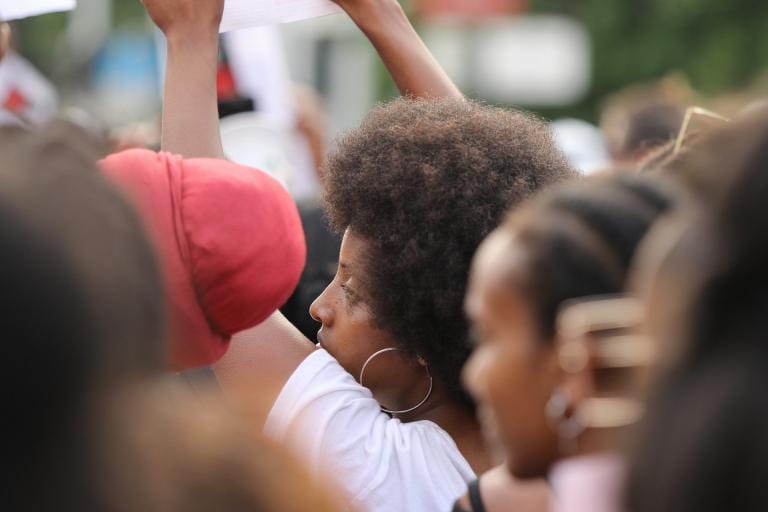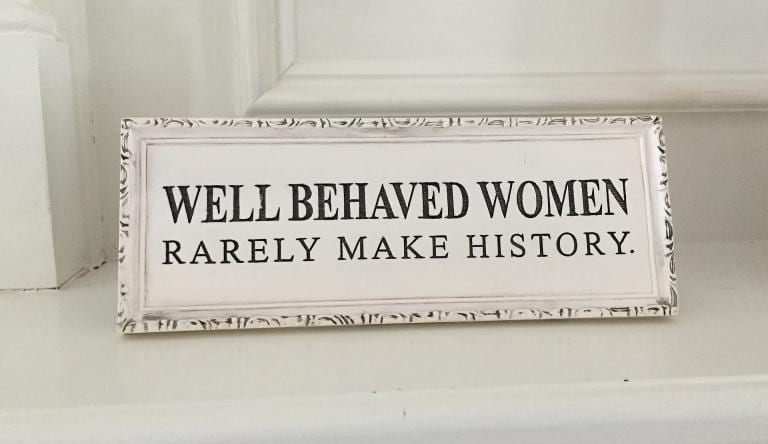I’ve been thinking about voices since a conversation I had with Serendipity Wyrd a few weeks ago. She’s been recording a self-love/yoga series on YouTube. In talking about it she said, “I am finally used to the sound of my own voice. For most of my life I’ve HATED my voice.”

So many of us—and not just those of us who identify as women—feel the same way. I know when I am recording one of my Moments For Meditation segments for KPPR I feel like I’m speaking in mellifluous and sonorous tones, but that’s not how I hear myself. To me, I sound flat and uninflected. Another friend who does a lot of recording says he has always hated how nasal his voice sounds.
Why do so many of us cringe at the sound of our own voices? More specifically, why do so many of us hate the sound of our voices when we raise them to publicly speak our Truth? Speak our Truth to Power?

I come from a generation that was taught children should be seen and not heard when in the company of adults. The original English proverb, according to phrases.org, “was [directed] specifically young women who were expected to keep quiet. This opinion is recorded in the 15th century collection of homilies written by an Augustinian clergyman called John Mirk in Mirk’s Festial, circa 1450: Hyt ys old Englysch sawe: A mayde schuld be seen, but not herd.”
As a child I was taught not to speak to an adult who was not family until they spoke to me first. I was taught to rise when an adult who was not family entered the room and not to reseat myself until that adult sat or left the room. The caretakers in my life didn’t think of it as suppression; they thought of it as good manners.
How many of us learned these lessons too well, I wonder? Not just those of us who identify as women, although yes, those folx primarily for my generation.
I was around 14 or 15 years old when Helen Reddy’s “I Am Woman” topped the charts. The first Women’s Liberation March had taken place on March 6, 1971, in London. Reddy’s anthem, included in her 1971 album, was recorded as a solo in 1972. She wrote:
I couldn’t find any songs that said what I thought being woman was about. I thought about all these strong women in my family who had gotten through the Depression and world wars and drunken, abusive husbands. But there was nothing in music that reflected that. The only songs were ‘I Feel Pretty’ or that dreadful song ‘Born A Woman’. (The 1966 hit by Sandy Posey had observed that if you’re born a woman “you’re born to be stepped on, lied to, cheated on and treated like dirt. I’m glad it happened that way”.) These are not exactly empowering lyrics. I certainly never thought of myself as a songwriter, but it came down to having to do it.
To further quote her from Wikipedia:
Reddy’s own long years on stage had also fueled her contempt for men who belittled women, she said. “Women have always been objectified in showbiz. I’d be the opening act for a comic and as I was leaving the stage he’d say, ‘Yeah, take your clothes off and wait for me in the dressing room, I’ll be right there’. It was demeaning and humiliating for any woman to have that happen publicly.”
This was a little over 50 years ago, folx. And yes, progress has been made from the teaching of 500+ years ago (“a mayde schuld be seen, but not herd”), but in the current Administration in Washington—and in the governing of certain States—we can’t help but see that this teaching is still woven into the fabric of our society.

Ruth Bader Ginsburg died a few days ago. NPR noted in their article:
She changed the way the world is for American women. For more than a decade, until her first judicial appointment in 1980, she led the fight in the courts for gender equality. When she began her legal crusade, women were treated, by law, differently from men. Hundreds of state and federal laws restricted what women could do, barring them from jobs, rights and even from jury service. By the time she donned judicial robes, however, Ginsburg had worked a revolution.
I think about RBG and how she was likely raised with the same rules of appropriate behaviors that I and so many others were raised with. Raised with 500-year-old rules designed to suppress her voice. I think about the Black Lives Matter movement and the 1619 Project, and over 400 years of Black bodies and voices that have been suppressed and worse. I think about the Black Trans Lives Matter movement, and of all my trans friends, also fighting so hard not to be erased, not to be suppressed.
I think about all of the ways our voices could be suppressed in the coming election cycle—through gerrymandering, voter intimidation, changes in the Postal Service—and I wonder again: why do so many of us cringe at the sound of our own voices? More specifically, the power of our voices?
I don’t have a particular answer to this question; indeed, that’s not why I felt moved to write this post. I’m simply moved to ask the question, and to ask you to contemplate it as well. Ruth Bader Ginsburg’s voice has not been silenced in death. Yours does not have to be silenced in life.

Perhaps you feel like I’ve conflated the spoken voice with the electoral voice. I would say there is a relationship between these two types of voices, for both grow and have their expression in and through you. How you view yourself—how you hear yourself—impacts how you speak, no matter the form of that speaking, vocal or otherwise.
If you hate the sound of your own voice, take a few moments to ask yourself why. Who or what taught you to feel that way? What has to happen for you to unlearn that old teaching?
How would a new way of hearing yourself impact the world around you? How would it impact how you have your being in the world?
You can hear more of The Corner Crone during her Moments For Meditation on KPPR Pure Pagan Radio on TuneIn.

















